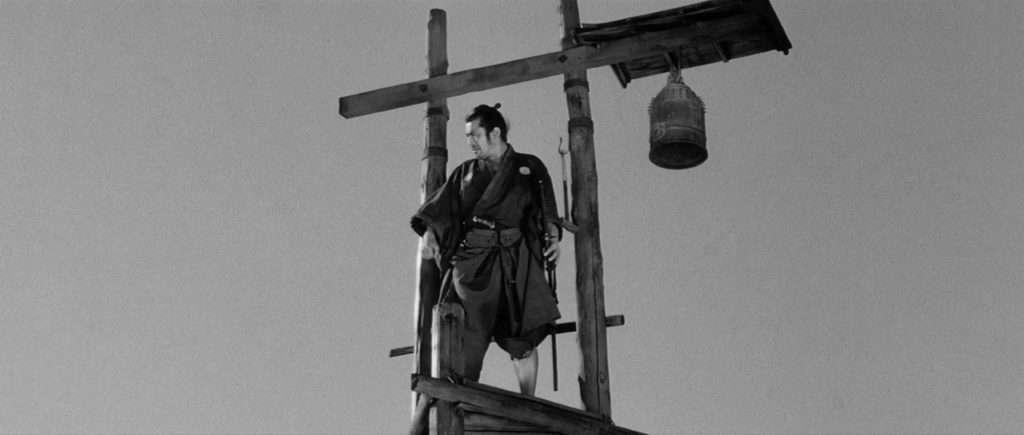Japan, 1961
Directed by Kurosawa Akira
With Mifune Toshirô (the samurai), Kawasu Seizaburô (Seibê), Sazanka Kyû (Ushitora), Nakadai Tatsuya (Unosuke), Shimura Takeshi (the innkeeper)

An unemployed samurai arrives in a village where people hide inside their houses and business is disrupted because of the endless fighting between two rival gangs. Each is led by men claiming they have the right to rule the place after the death of the previous village chief. Dismissing the advice of the innkeeper welcoming him, the samurai settles down and tries to be hired by whoever is ready to pay the highest. That seems fair game, though remarkably selfish; but it turns out that the warrior’s purpose is to manipulate both sides and to push them to destroy each other. He pulls it off and leaves the village without any reward.
The director of “The Seven Samurai” (1954) examines again the case of a swordsman facing a world in trouble – this time after the Meiji revolution, which has upset the social position of the samurai. The plot becomes fiendishly, though pleasantly, convoluted as the samurai invents new tricks to convince the two rivals, Seibê and Ushitora, of his goodwill and learns to adapt to every twist of their fight. The most remarkable incidents include the visit of a high-ranking official duped into believing the place is safe; the plight of a young, attractive married woman forced to live with a rich merchant supportive of Seibê; and the coming home of Unosuke, Ushitora’s son, wielding a pistol in his hand, a new weapon which is going to change the rules of engagement.
The samurai’s self-reliant, self-controlled and self-aware mind is always tested but he remains surprisingly good-natured. Coming and going from one end of the village to the other, he quietly exhibits his poise and craft whose superiority is unquestioned – and envied by the rival gangs. Meanwhile at the inn, he proves how cunning and focused he is, which constantly worries his host.
In “Yôjinbô – The Bodyguard” violence is rife (the samurai is greeted at the start by a stray dog holding a hand in his jaws; by the end the audience has probably stopped counting the dead). Yet the overall tone is humorous. Grotesque characters and mischievous situations point to the futility of the rivalry, which sounds like a race between pathetic nonentities. Most of the characters’ foibles are slammed and the narrow-minded cruelty of the would-be leaders is unrelentingly emphasized. In this slough of despond, the samurai is not only a wicked actor but the amused witness. Anyway, he would get the last laugh.
The soundtrack gives an astonishing jazzy rhythm to this modern, Japanese knight-errantry. Rather pervasive, sometimes too loud, it underlines the dramatic developments that shooting and editing make effortlessly effective. Acting gets the maximum impact from close shots of the characters carefully placed inside the frame, taken from a dynamic angle that makes the most of the Tohoscope (the same treat was on display in “Warui yatsu hodo yoku nemuru – The Bad Sleep Well” released a year earlier). That sense of composition serves Mifune Toshirô well; then at the height of his talent, laughing and slashing his way through the story, he shows great confidence, and a near-perfect command of the role’s emotions. His performance is no small contribution to the success of this rambunctious, cheerful, and convincing entertainment by Kurosawa Akira.

